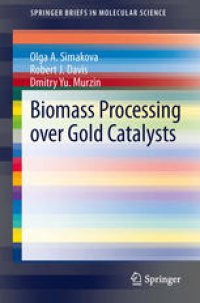
Ebook: Biomass Processing over Gold Catalysts
- Tags: Catalysis, Renewable and Green Energy, Metallic Materials
- Series: SpringerBriefs in Molecular Science
- Year: 2013
- Publisher: Springer International Publishing
- Edition: 1
- Language: English
- pdf
The book describes the valorization of biomass-derived compounds over gold catalysts.
Since biomass is a rich renewable feedstock for diverse platform molecules, including those currently derived from petroleum, the interest in various transformation routes has become intense. Catalytic conversion of biomass is one of the main approaches to improving the economic viability of biorefineries. In addition, Gold catalysts were found to have outstanding activity and selectivity in many key reactions.
This book collects information about transformations of the most promising and important compounds derived from cellulose, hemicelluloses, and woody biomass extractives. Since gold catalysts possess high stability under oxidative conditions, selective oxidation reactions were discussed more thoroughly than other critical reactions such as partial hydrogenation, acetalization, and isomerization.
The influence of reaction conditions, the role of the catalyst, and the advantages and disadvantages of using gold are presented for all of the reactions mentioned above.
This book provides an overview of the recent research results focusing on application of gold catalysts for synthesis of valuable chemicals using renewable feedstocks.
The book describes the valorization of biomass-derived compounds over gold catalysts.
Since biomass is a rich renewable feedstock for diverse platform molecules, including those currently derived from petroleum, the interest in various transformation routes has become intense. Catalytic conversion of biomass is one of the main approaches to improving the economic viability of biorefineries. In addition, Gold catalysts were found to have outstanding activity and selectivity in many key reactions.
This book collects information about transformations of the most promising and important compounds derived from cellulose, hemicelluloses, and woody biomass extractives. Since gold catalysts possess high stability under oxidative conditions, selective oxidation reactions were discussed more thoroughly than other critical reactions such as partial hydrogenation, acetalization, and isomerization.
The influence of reaction conditions, the role of the catalyst, and the advantages and disadvantages of using gold are presented for all of the reactions mentioned above.
This book provides an overview of the recent research results focusing on application of gold catalysts for synthesis of valuable chemicals using renewable feedstocks.
The book describes the valorization of biomass-derived compounds over gold catalysts.
Since biomass is a rich renewable feedstock for diverse platform molecules, including those currently derived from petroleum, the interest in various transformation routes has become intense. Catalytic conversion of biomass is one of the main approaches to improving the economic viability of biorefineries. In addition, Gold catalysts were found to have outstanding activity and selectivity in many key reactions.
This book collects information about transformations of the most promising and important compounds derived from cellulose, hemicelluloses, and woody biomass extractives. Since gold catalysts possess high stability under oxidative conditions, selective oxidation reactions were discussed more thoroughly than other critical reactions such as partial hydrogenation, acetalization, and isomerization.
The influence of reaction conditions, the role of the catalyst, and the advantages and disadvantages of using gold are presented for all of the reactions mentioned above.
This book provides an overview of the recent research results focusing on application of gold catalysts for synthesis of valuable chemicals using renewable feedstocks.
Content:
Front Matter....Pages i-viii
Introduction....Pages 1-9
Selective Oxidation/Dehydrogenation Reactions....Pages 11-31
Acetalization....Pages 33-33
N-Alkylation....Pages 35-37
Selective Hydrogenation Reactions....Pages 39-40
Double Bond Oxidation Reactions....Pages 41-42
Isomerization Reactions....Pages 43-45
Gold Catalysts Stability....Pages 47-49
Summary....Pages 51-51
Back Matter....Pages 53-54
The book describes the valorization of biomass-derived compounds over gold catalysts.
Since biomass is a rich renewable feedstock for diverse platform molecules, including those currently derived from petroleum, the interest in various transformation routes has become intense. Catalytic conversion of biomass is one of the main approaches to improving the economic viability of biorefineries. In addition, Gold catalysts were found to have outstanding activity and selectivity in many key reactions.
This book collects information about transformations of the most promising and important compounds derived from cellulose, hemicelluloses, and woody biomass extractives. Since gold catalysts possess high stability under oxidative conditions, selective oxidation reactions were discussed more thoroughly than other critical reactions such as partial hydrogenation, acetalization, and isomerization.
The influence of reaction conditions, the role of the catalyst, and the advantages and disadvantages of using gold are presented for all of the reactions mentioned above.
This book provides an overview of the recent research results focusing on application of gold catalysts for synthesis of valuable chemicals using renewable feedstocks.
Content:
Front Matter....Pages i-viii
Introduction....Pages 1-9
Selective Oxidation/Dehydrogenation Reactions....Pages 11-31
Acetalization....Pages 33-33
N-Alkylation....Pages 35-37
Selective Hydrogenation Reactions....Pages 39-40
Double Bond Oxidation Reactions....Pages 41-42
Isomerization Reactions....Pages 43-45
Gold Catalysts Stability....Pages 47-49
Summary....Pages 51-51
Back Matter....Pages 53-54
....